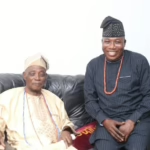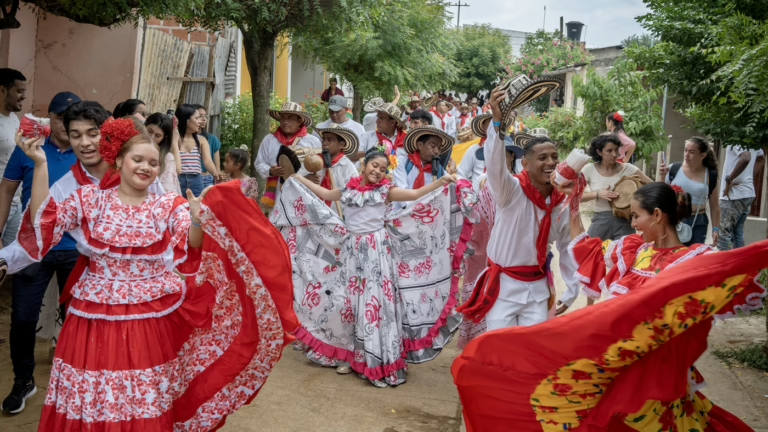Groups of gaiteros, dancers, and community members march toward the San Jacinto cemetery in Colombia on August 14, 2022.
Karla Gachet
hide caption
toggle caption
Karla Gachet
This article is part of the special series, Cumbia Across Latin America, a photographic journey through six nations highlighting the communities, traditions, and environments that sustain this vibrant musical style.
During the colonial era, all forms of dance were often viewed as acts of defiance. The Caribbean region of Colombia, particularly within the Mompos Depression’s vast river wetlands and the Montes de María mountain range, is recognized as the cradle of cumbia. In the 16th century, the port city of Cartagena became a landing point for thousands of enslaved Africans who were forcibly brought to the Americas. Along with their displacement, they carried with them rich musical traditions, sacred drums, and spiritual practices. These drums also played a crucial role in covert communication during escapes from slavery.
From left to right: Diomar Trigos, Esneider Páez, Humberto Cañizares, and Sebastián Suárez stand on a street after the Pocabuyano Parade in El Banco, Magdalena, Colombia, during the National Festival of Cumbia on October 15, 2022. They represent San Alberto, Cesar, wearing traditional cumbia attire.
Ivan Kashinsky
hide caption
toggle caption
Ivan Kashinsky
Laborers unload sand at the El Cesar dock in El Banco, Colombia, on August 8, 2022. A fishing boat is visible returning to the dock in the background.
Karla Gachet
hide caption
toggle caption
Karla Gachet
José Benito Africano Mendoza performs cumbias for people gathered along the Magdalena River in El Banco, Magdalena, Colombia, on August 7, 2022.
Ivan Kashinsky
hide caption
toggle caption
Ivan Kashinsky
The wetlands were once inhabited by numerous Indigenous communities, often described as amphibious due to their close relationship with water. These groups are believed to have used bone flutes in their sacred ceremonies. In the Montes de María, where other Indigenous peoples resided, archaeologists have uncovered small figurines depicting humans playing instruments similar to gaitas-traditional Indigenous flutes also called chuanas. The attire worn during traditional dances, the lyrical storytelling, and the couple dances reveal European cultural influences. The instruments crafted in this region are inspired by natural elements, imitating the calls of riverbank birds, the rhythm of rainfall, or the pulse of a heartbeat.
Carlos Casas Serrano crafts a tambor alegre, a traditional cumbia drum, in Colilo Lara’s workshop on August 12, 2022, in San Jacinto, Bolívar, Colombia, during the Festival Nacional Autóctono de Gaitas. Colilo, son of one of the original Gaiteros de San Jacinto, has been making drums for over fifty years. The gaita, a traditional instrument made from cactus, is deeply connected to cumbia’s origins.
Ivan Kashinsky
hide caption
toggle caption
Ivan Kashinsky
Portrait of Orlando Jose Blanco Alvarez with his tambor alegre on August 12, 2022, during the Festival Nacional Autóctono de Gaitas in San Jacinto, Colombia. A gaita ensemble, featuring Indigenous flutes and Afro-Colombian drums, performs traditional cumbia rhythms.
Karla Gachet
hide caption
toggle caption
Karla Gachet
Hundreds of dancers, musicians, and festival queens parade through El Banco, Magdalena, Colombia, during the José Barros Palomino National Festival of Cumbia on October 15, 2022.
Karla Gachet
hide caption
toggle caption
Karla Gachet
Yojan David Laguna Ospino and Jakelin Guillen Epalza, both 11, from the dance troupe Costa Azul Danza Indio Manzos, pose in Playa Blanca, Guamal, near El Banco, Magdalena, Colombia, on August 6, 2022.
Ivan Kashinsky
hide caption
toggle caption
Ivan Kashinsky
Melgen Melendez Baena, a cumbia dancer from Barranquilla, raises his hand as Cristobal Perez Santos, 72, watches from his wheelchair during a parade of gaitero groups and dancers in San Jacinto, Bolívar, Colombia, on August 14, 2022, at the Festival Nacional Autóctono de Gaitas. The gaita, a traditional cactus-made instrument, is closely linked to cumbia’s origins.
Ivan Kashinsky
hide caption
toggle caption
Ivan Kashinsky
The gaita ensemble Son de Quitasol rehearses on August 13, 2022, during the Festival Nacional Autóctono de Gaitas in San Jacinto. Musicians from various regions used a local school as lodging during the event.
Karla Gachet
hide caption
toggle caption
Karla Gachet
Yieson Landero, grandson of famed cumbia composer Andrés Landero, records a cumbia track at Estudio Mastil Récords on August 12, 2022, in San Jacinto, Bolívar, Colombia, during the Festival Nacional Autóctono de Gaitas.
Ivan Kashinsky
hide caption
toggle caption
Ivan Kashinsky
José Benito Africano Mendoza poses with his guitar inside his home in El Banco Magdalena, Colombia, on August 7, 2022. He composes and performs cumbias, including “Nostalgia de mi Tierra,” a song about El Banco. Despite his talent, his music remains unpublished, and he dreams of performing at the National Festival of Cumbia.
Ivan Kashinsky
hide caption
toggle caption
Ivan Kashinsky
Emilia Reyes Salgado, affectionately known as “la Burgos la Meya,” stands out as one of the foremost bullerengue vocalists from San Basilio de Palenque, the first free African-descendant town in the Americas. Nearby, in Arjona, lives Petrona Martinez, who earned the 2021 Latin Grammy for Best Folk Album with Ancestras. In María la Baja, Pabla Flores, descending from a family of singers, has founded a school honoring her mother, who was her first teacher. The African heritage of cumbia resonates not only through its percussion instruments-the tambor alegre, llamador, and tambora-but also through the voices of ancestral women. Afro-Colombian women are the custodians of this musical tradition, passing it down through generations.
Ana Regina Ardila Matos poses in her hometown of San Martín de Loba, Bolívar, Colombia, on August 5, 2022. She is a cantadora of tambora, a rhythm closely related to cumbia, using the same instruments. Ardila comes from a lineage of women who compose songs about daily life, passed down orally. Many cantadoras in the region have grown up amid poverty, conflict, and displacement.
Karla Gachet
hide caption
toggle caption
Karla Gachet
Elida Cañates braids hair extensions on Suleidis Villegas on August 4, 2022, in Palenque de San Basilio, Colombia. The hairstyle, called “caminos,” is part of Afro-Colombian cultural heritage. San Basilio de Palenque is recognized as the first free town in the Americas, founded by escaped enslaved Africans in the 17th century. Braided hairstyles historically served as escape maps.
Karla Gachet
hide caption
toggle caption
Karla Gachet
Sunrise over the dock and Magdalena River in El Banco Magdalena, Colombia, on August 9, 2022. The local culture, including cumbia, is deeply intertwined with the river and the fishing community.
Ivan Kashinsky
hide caption
toggle caption
Ivan Kashinsky
San Jacinto, nestled in the Montes de María, serves as the heartland of gaita music, renowned for the Gaiteros de San Jacinto and the cumbia legacy of Andrés Landero, one of Latin America’s most cherished accordionists. This area was once a stronghold of the FARC (Revolutionary Armed Forces of Colombia). It is said that guerrilla fighters would permit musicians to pass if they carried their instruments. Throughout a civil conflict spanning over fifty years, the gaita-a pre-Hispanic flute fashioned from cactus core and adorned with a duck feather-emerged as a symbol of peace. These Indigenous melodies continue to infuse cumbia with life and spirit.
Ingrid Cifuentes dances with candles as gaitas and drums play and people dance cumbia in the main plaza on August 13, 2022, in San Jacinto, Bolívar, Colombia, during the Festival Nacional Autóctono de Gaitas. The gaita, a traditional cactus-made instrument, is closely linked to cumbia’s origins.
Ivan Kashinsky
hide caption
toggle caption
Ivan Kashinsky
José Benito Barros, a native of El Banco, Magdalena, composed iconic Colombian cumbias such as “La Piragua” and “El Pescador.” Early in his career, Barros did not embrace the traditional rhythms of his homeland. This music, deeply rooted in the lives of fishermen and storytellers along the Magdalena River, was initially dismissed by the country’s middle and upper classes. However, recognizing its widespread appeal, Barros eventually embraced these rhythms. In 1970, he organized the inaugural cumbia festival in El Banco, serving as both judge and performer. Today, his daughters and local dignitaries continue to host this annual celebration. While the main port area is adorned to welcome official guests, nearby impoverished neighborhoods still endure extortion from armed groups.
This report was produced with support from the National Geographic Explorer program.
Photojournalists Karla Gachet and Ivan Kashinsky are based in Los Angeles. Explore Karla’s portfolio at KarlaGachet.com and follow her on Instagram @kchete77. Ivan’s work is available at IvanKphoto.com and on Instagram @ivankphoto.



















